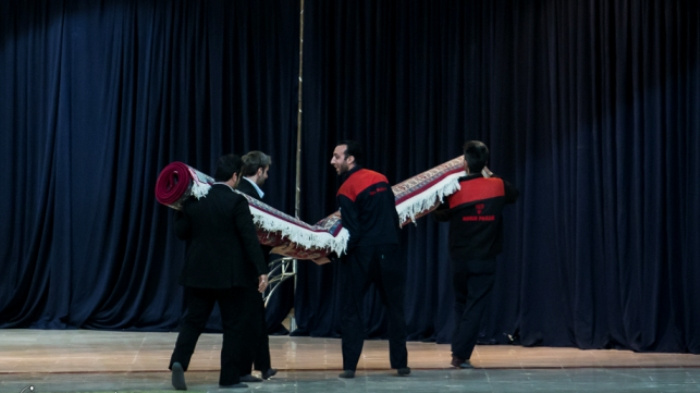Iran’s Friday Prayers: Elections and post-JCPOA economy

(Rolling the carpets for the prayers. Source: Arash Mirsepasi/YJC)
Less than one month before elections for the parliament and the body of experts, it is predictable that the topic hogs Friday prayers’ sermons. This and the post-sanction circumstances were the two main subjects of this week’s Friday prayers.
In Tehran, Kazem Seddighi called for vigilance against infiltration of unwanted elements into the parliament. “God forbid that we see a Majles where they read American statements, or our Assembly of Experts turns into a battle field of [political] groups.” In Mashhad, Ayatollah Alamolhoda asked the congregation not to vote in the Assembly of Experts’ elections according to their political bias, “otherwise they have not fulfilled their religious duty.”
In Isfahan, Friday prayers’ leader Ayatollah Tabatabaeinejad called for a new mechanism which sets constraints for nomination in the elections. “Strict conditions should be set so the Guardian Council spends time for considering a limited number of nominees, not 12 thousand individuals,” he said. Tabatabaeinejad also criticized those advocating the principle of Presumption of Innocence in examining the record of candidates, calling it a “hoax”. He also warned about “insults” against the Guardian Council. “Nobody has the right to offend or undermine the Guardian Council in their interviews or speeches,” he stated. “Such a corrupt person should be persecuted.”
Tehran’s Friday prayers’ imam Kazem Seddighi, who was surprisingly announced ineligible for running in the Assembly of Experts’ elections also addressed the post-JCPOA era. He mentioned Iranians’ endurance as the key to achieving the JCPOA. “The world intended to provoke the people against the establishment through sanctions and economic pressure,” he said. “But despite these unfair pressures, our nation did not only become tried, but sensed the ugly, brutal face of the oppressors”, or the imperial powers. Adding that only twenty percent of the country’s economic problems were the result of sanctions, he called for “reliance on domestic forces and organization of ‘resistance economy’”, Ayatollah Khamenei’s proposed economic growth model, to solve problems.
In Birjand, in southeastern Iran, Hojjatoleslam Rezaei Birjandi however said that Iran lost 150 million dollars and 2,400 jobs per day during the sanctions. Rezaei Birjandi also called for implementation of Resistance Economy, warning about Iran turning into a market for European commodities. Ayatollah Tabarsi, Friday prayers’ imam of Sari, center of Mazandaran Province, also reminded that President Hassan Rouhani’s visit to France and Italy does not imply Iran’s open gates for all commodities, stressing the need for strengthening domestic production units. Also in Ilam, in western Iran, Hojjatoleslam Lotfi called for improvement of economic conditions now that the sanctions have ended. “People’s rightful demand from the government and senior officials is to end recession [and] pave the way for increase of domestic production,” he said.

